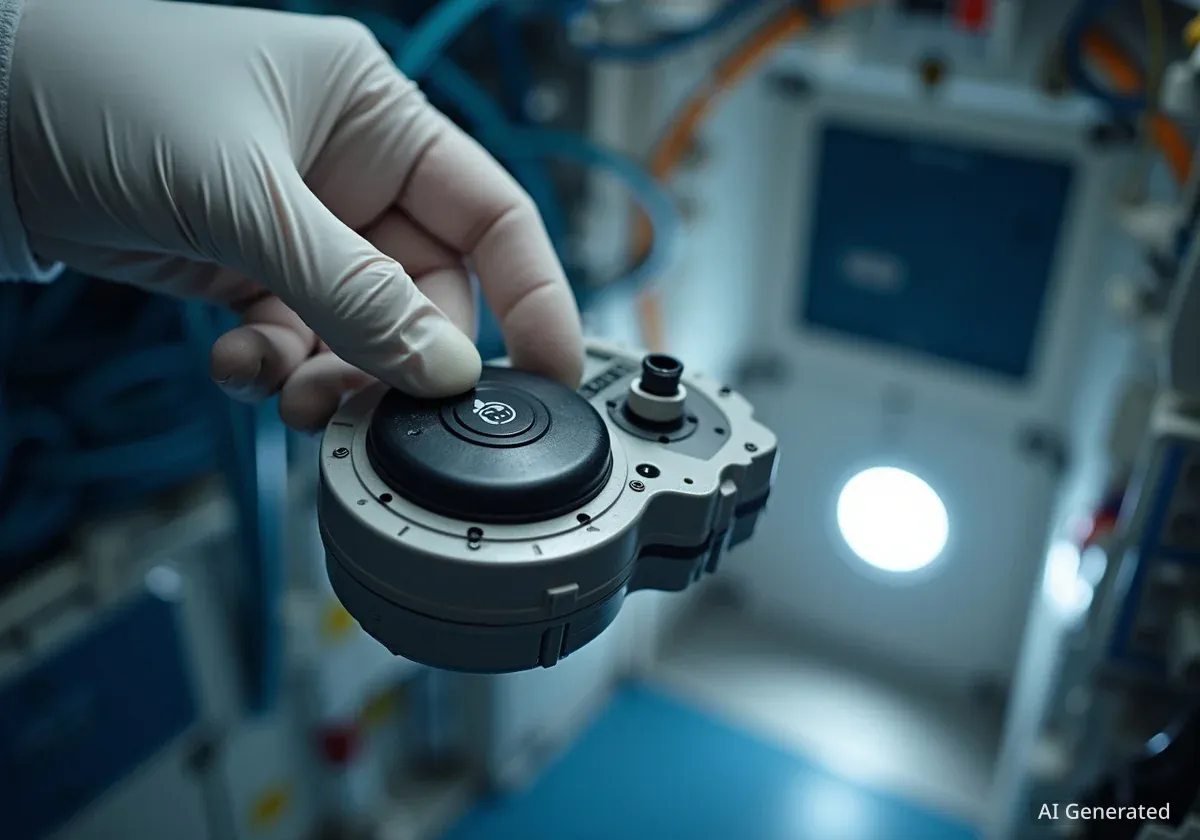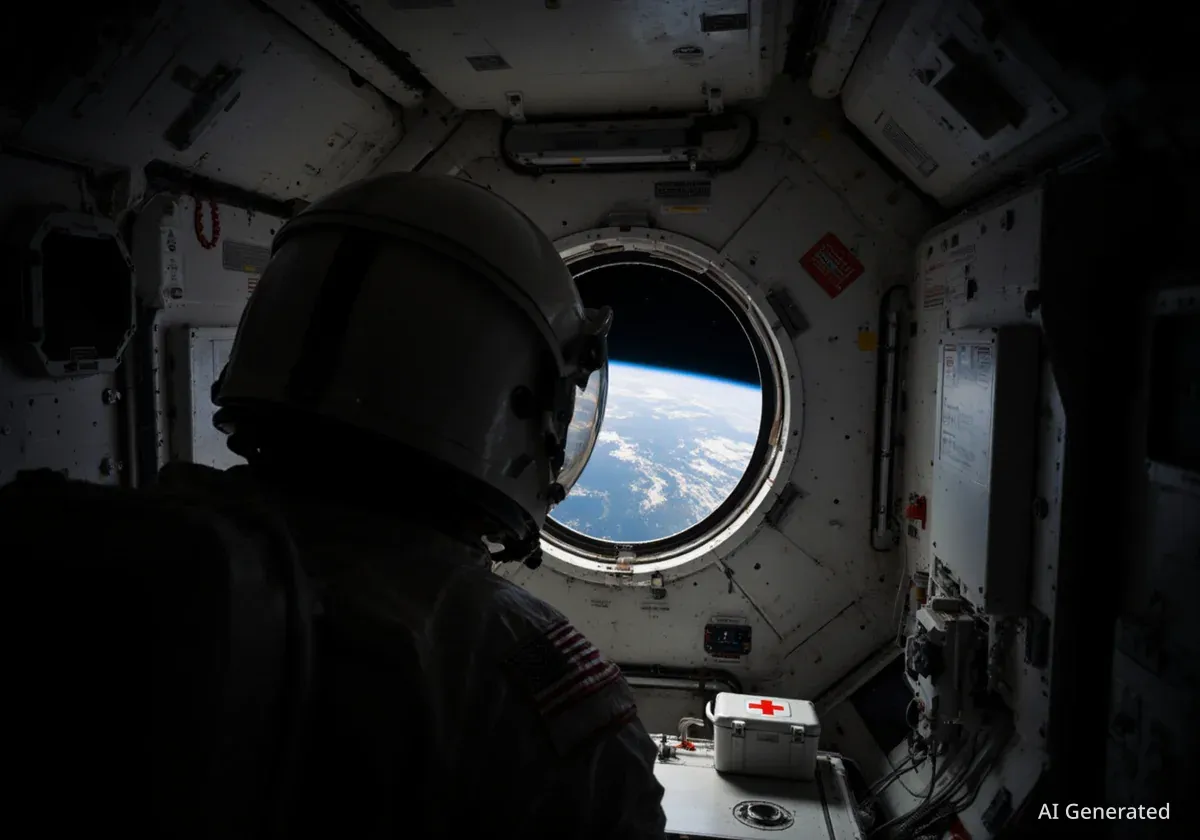An advanced cardiovascular ultrasound system from GE HealthCare has been delivered to the International Space Station (ISS) to support astronaut health and ongoing scientific research. The device, known as the Vivid iq, was part of a recent NASA cargo resupply mission launched by SpaceX.
This new equipment replaces an older model that has been in use for over a decade. It will provide astronauts and ground-based medical teams with higher-quality imaging capabilities to monitor the effects of long-duration spaceflight on the human body, particularly the cardiovascular system.
Key Takeaways
- GE HealthCare's Vivid iq ultrasound system is now operational on the International Space Station.
- The device replaces the Vivid q model, which was first sent to the station in 2011.
- It will be used for astronaut health assessments and research into heart function and blood flow in microgravity.
- The system was delivered by a SpaceX Falcon 9 rocket as part of a NASA-contracted cargo mission.
Upgraded Medical Technology for Orbit
The arrival of the Vivid iq marks a significant upgrade to the medical diagnostic tools available aboard the ISS. According to GE HealthCare, the new system offers enhanced imaging quality and improved portability compared to its predecessor, the Vivid q.
The original Vivid q was a vital instrument for health monitoring since its installation in 2011. However, technological advancements over the past 14 years have led to more powerful and compact ultrasound devices. The Vivid iq represents the latest generation of this technology.
The Challenge of Spaceflight on Health
Living in a microgravity environment for extended periods can have significant effects on the human body. Without the constant pull of Earth's gravity, fluids shift towards the head, muscles can atrophy, and bone density can decrease. The cardiovascular system is particularly affected, as the heart does not have to work as hard to pump blood.
Mission and Launch Details
The journey of the Vivid iq system to the ISS began on September 14, 2025. The device was part of the cargo aboard a Northrup Grumman Cygnus XL spacecraft.
This spacecraft was launched into orbit by a SpaceX Falcon 9 Block 5 rocket. The liftoff occurred from NASA’s Kennedy Space Center in Florida, a primary site for U.S. space missions. The successful delivery ensures that the crew has access to the upgraded medical equipment for their mission objectives.
Critical Role in Astronaut Health and Research
The primary function of the Vivid iq on the ISS is twofold: routine health monitoring and specialized scientific research. Astronauts will use the device for general health assessments, allowing medical teams on Earth to keep a close watch on their physical condition.
This continuous monitoring is crucial for ensuring the well-being of crew members during missions that can last six months or longer. Early detection of any health issues is a top priority for NASA's medical operations team.
A Legacy of Medical Imaging in Space
Ultrasound technology has been used on the space station for over two decades. It is a valuable diagnostic tool because it is non-invasive, does not use radiation, and can provide real-time images of internal organs, muscles, and blood vessels. Astronauts receive special training to perform ultrasounds on themselves and their crewmates with guidance from doctors on the ground.
Focus on Cardiovascular Studies
In addition to general check-ups, the Vivid iq will be a key instrument in specific research investigations. Scientists are particularly interested in understanding how microgravity affects the cardiovascular system.
Key areas of study include:
- Venous Blood Flow: Researchers will use the device to study changes in blood flow, particularly in the veins of the upper body and head. Stagnant or reversed blood flow has been observed in some astronauts.
- Heart Function: The system will provide detailed images of the heart, allowing scientists to assess its structure and function over the course of a long-duration flight.
- Adaptation to Microgravity: Data from these studies will help scientists understand how the human body adapts to space and how it readapts to gravity upon returning to Earth.
The high-resolution images from the Vivid iq are expected to provide more detailed data than was previously possible, contributing valuable knowledge for future long-duration missions, including potential journeys to Mars.
Supporting the Future of Human Spaceflight
As NASA and its international partners plan for more ambitious missions beyond low-Earth orbit, ensuring astronaut health and safety becomes even more critical. The medical technologies tested and used on the ISS, such as the Vivid iq, are essential for this goal.
The data collected from research on the space station informs the development of countermeasures to mitigate the negative health effects of space travel. This includes exercise regimens, nutritional strategies, and medical monitoring protocols.
The deployment of the new ultrasound system is a practical step in preparing humans for the challenges of deep space exploration. It provides a powerful tool to protect the health of current astronauts while gathering the information needed to safeguard the crews of tomorrow.





